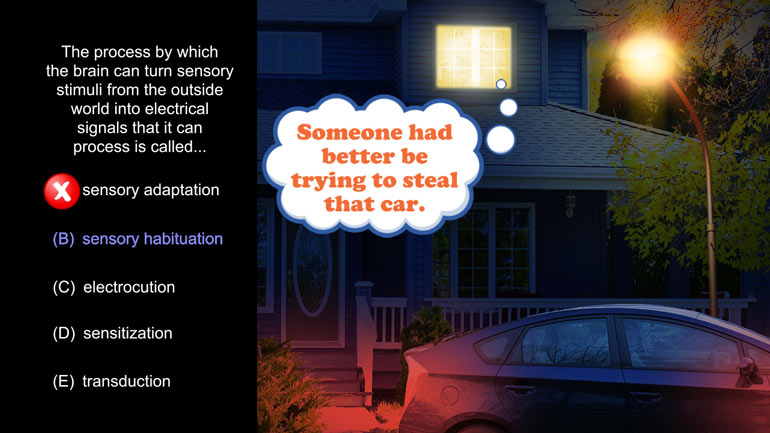ShmoopTube
Where Monty Python meets your 10th grade teacher.
Search Thousands of Shmoop Videos
AP Psychology 1.5 History and Approaches 5 Views
Share It!
Description:
AP Psychology 1.5 History and Approaches. The area of psychology focused on determining causes, treatments, and prevention of psychological disorders is called what?
Transcript
- 00:04
And here's your shmoop du jour brought to you by psychology and
- 00:07
[Man and woman sat in a psychologist's office] how does that make you feel? ...Here's our question the area of psychology focused
- 00:12
on determining causes treatments and prevention of psychological disorders is
- 00:16
called and here's your potential answers....
- 00:23
Well for this question it's really all in the name take answer A please educational [Man sitting in a chair]
Full Transcript
- 00:27
psychology is the branch of psychology concerned with yep you guessed it how we
- 00:30
learn.. differences in intelligence cognitive development and motivations for
- 00:35
learning are all things that contribute to the study of how when and why we [Girl dancing around]
- 00:38
learn they're also things that fall under the umbrella of educational [Man holding an education psychology umbrella]
- 00:41
psychology well personality psychology is concerned with human personalities
- 00:46
and the psychological similarities and differences between individuals...Several
- 00:51
prevalent theories seem to explain these similarities and differences including [Dump truck unloading theories]
- 00:54
trait theories, personality type theories, psychoanalytic theories and a ton of
- 00:58
other theories that don't have a lot to do with what we're looking for.. Cognitive
- 01:01
psychology focuses on the study of the mind and mental function and in a more [Man's head opens and lots of cogs are turning]
- 01:05
modern context it considers the brain as one effectively complex computing
- 01:09
system of course some cognitive psychology would deal with psychological
- 01:13
disorders but to feel itself is simply to broad to fit our answers so we can cross off C.
- 01:17
....And similarly behavioral psychology a field concerned mainly with behavior and [Man crying while sitting with a girl on a park bench]
- 01:22
how behavior is caused often deals directly with psychological disorders
- 01:25
modern behavioral psychologists often study and treat mental disorders like
- 01:29
autism, substance abuse, addiction, depression and mental illness but while
- 01:34
it's incredibly important it's also apparently been taking the elevator of [Girl kicking books around a room]
- 01:38
it too often by which we mean it's far too broad for our definition so we can
- 01:42
eliminate E...Which means that our trim fit and most importantly correct answer
- 01:45
is D; clinical psychology - Clinical psychology is the area of psychology
- 01:50
that examines the reasons why mental disorders like anxiety, depression and [Man pointing to a definition of clinical psychology]
- 01:54
schizophrenia occur and how to manage and prevent them which is exactly what
- 01:58
we're looking for now back to the most important question how did answering
- 02:01
this question make you feel?... [Two people sitting in a psychologist office]
Up Next
AP Psychology 2.2 Social Psychology. Which of the following was an independent variable manipulated in Asch's research?
Related Videos
AP Psychology 1.1 Personality. According to Freud, these three parts of personality are constantly in conflict.
AP Psychology 1.1 Sensation and Perception. The process by which the brain can turn sensory stimuli from the outside world into electrical signals...
AP Psychology 1.1 Social Psychology. Which of the following best describes social psychology?
AP Psychology 1.1 States of Consciousness. Who conducted research on REM sleep deprivations?




